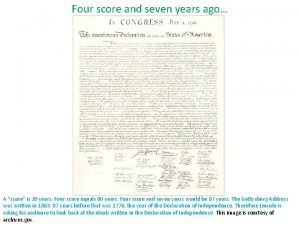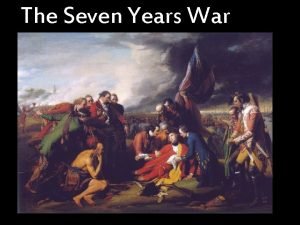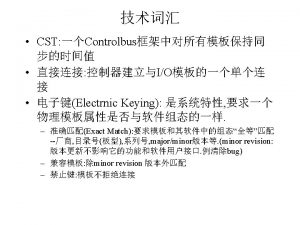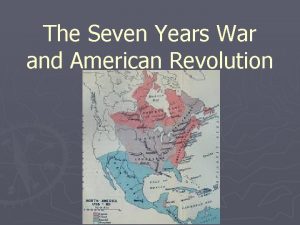Causes of the Revolution Seven Years War 1756








- Slides: 8

Causes of the Revolution

Seven Years War (1756 -63) After 1763 the 13 American colonies became increasingly dissatisfied with British rule. There were several causes for their growing unrest and these causes were connected to each other Britain and France had been fighting with each other for many years Between 1689 and 1763 they fought four major wars against each other. The French colonies in North America had grown faster than the English colonies.

The fighting that took place in North America between the British and the French during the Seven Years war is sometimes referred to as the French and Indian War The colonists in the 13 colonies were glad to see the defeat of the French because it removed a threat to their security and expansion The war caused Britain to go heavily into debt and the idea was to tax the colonies to pay for the cost of the war.

Proclamation of 1763 The trouble really began when the well-meaning men running the government in London decided in 1763 to set this far-flung empire in order To prevent fighting among the colonies, and to avoid war with the Indians, the officials in London decided to try to keep the colonists confined where they already were Settlement of the new lands would have to wait until Indian relations and a land policy were worked out The British thought that the Appalachian Mountains which ran roughly parallel to the Atlantic coastline – would be a useful guideline to keep the colonists separated from the Indians The Proclamation Line of 1763 did not please the people of Virginia as they wanted to expand for tobacco farming

Sugar Act of 1764 George Grenville (Chancellor of the Exchequer) was desperately looking for ways to pay the bills left over from the wars Sugar Act replaced the old Molasses Act Grenville lowered the duty on Molasses to threepence a gallon and he intended to collect it Since the colonists had regularly paid a bribe of a penny and a half per gallon to the customs officer, Grenville reckoned that they could afford to pay the duty Purpose was to raise money

Stamp Act – March 1765 Britain imposed on the colonies a kind of tax that had long been used in England Now put taxes on all sorts of everyday things – proof of payment with specially stamped paper If you do not have stamps for item they would be seized and you would be tried without a jury and be fined or jailed

Declaratory Act – March 18, 1766 Americans did not want their lives to be run by others. Britain wanted all the power and did not want to give up any power The colonists were practical people. They knew it was possible for Parliament to run their foreign affairs and still permit Americans to have their own assemblies Stamp Act repealed on March 18, 1766 but London felt they had to pass a Declaratory Act that stated governments still had power to make laws for Americans

Townshend Act Government still wanted money from colonists Passed in 1767 by parliament Custom duties were placed on glass, paint, lead, paper and tea – goods that were imported from Britain to the 13 colonies Hoped that through indirect taxation they could raise money Colonial assemblies regarded the Townshend Acts as a direct attack on their powers Once again the colonists boycotted British goods. Boycot worked and British merchants lost customers and American merchants improved















